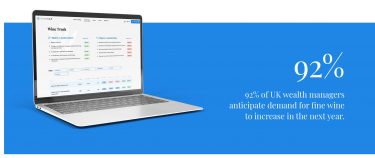How technology has democratised fine wine investment in 2024
- Technology has democratised fine wine investment by opening new avenues and making the asset more accessible to novice investors.
- Since last year, there has been a 32% increase in UK investor confidence in the market’s liquidity – a shift partly driven by technology.
- 80% of UK investors believe that technology like blockchain will create more security and confidence in the sector.
In the world of fine wine, exclusivity has long defined the industry, which has historically attracted seasoned aficionados and connoisseurs with extensive resources and specialised knowledge.
In recent years, technology has democratised the sector, opening new avenues and making fine wine appeal to a more diverse investor demographic.
According to our 2024 UK Wealth Report, technological advancements have contributed to fine wine going mainstream and thus expanding the market’s appeal to a broader audience, in particular, less experienced investors. Technology has simplified buying and selling processes, enhanced pricing transparency and improved the market’s overall liquidity.
Technology leads to an increase in investor confidence
Since last year, there has been a 32% increase in UK investor confidence in the market’s liquidity – a shift partly driven by technological advancements. In the US, this number is 14%.
An increasing number of fine wine investors are leveraging data and technology to inform their buying and selling strategies and track the value of their portfolio.
Online platforms, like WineTrack, have made it easier to identify investment opportunities, compare prices and critic scores and track a brand’s historic performance all in one place. Meanwhile, fine wine indices like the Liv-ex regional indices can help investors compare the performance of different regions and identify market trends.

Advanced technology’s role in fine wine trading
According to our survey, investors and wealth managers are increasingly receptive to new developments, like the use of blockchain technology, in the fine wine investment landscape.
80% of UK investors believe that technology like blockchain will create more security and confidence in the sector, up from 56% last year. In the US, 76% of investors recognise its benefits, up from 54% in 2023.
52% of the UK survey respondents think that blockchain will make reputable releases, such as En Primeur offers, more accessible for investors without using a third party. Still, 6% of them remain sceptical about how this would work in practice.
Meanwhile, 46% of US wealth managers think that blockchain will bring greater transparency in the supply chain, and further boost investor confidence.
As a growing number of new investors consider fine wine for its unique benefits diversifying traditional portfolios, technological innovations continue to redefine their overall experience and industry standards.
From blockchain contributing to supply chain transparency to online wine investment platforms shaping decision-making, these technological advancements are evening out the playing field by creating new opportunities in the market and appealing to a broader audience.
For those interested in exploring this trend further, WineCap’s 2024 Wealth Report offers an in-depth look into the top motivations for investing in fine wine, the trends shaping the market, and investor sentiment.
Download your complimentary copy here.
WineCap’s independent market analysis showcases the value of portfolio diversification and the stability offered by investing in wine. Speak to one of our wine investment experts and start building your portfolio. Schedule your free consultation today.
Three reasons why the Brexit deal will prevent customers from paying more for their wine.
Ever since the UK voted to leave the European Union in 2016, trade talks and negotiations between the two sides had been full of uncertainty, posturing and brinkmanship which at times made it feel like a deal was unobtainable. So, the news that a trade deal – now ratified by the UK Parliament - had been struck on Christmas Eve last year was met with welcome relief across all industry sectors on both sides of the Channel and especially by those looking to invest in wine.
1. The costly VI-1 import documentation for UK and EU wines is no longer going to be introduced in July as previously planned. Taking its place will be a straightforward Wine Import Certificate which asks for basic producer and product information. This means far less admin and fees for wine importers, which in turn means no extra costs will be passed on to customers.
2. Crucially, wines will not have to undergo lab assessment for the new Wine Import Certificate. Submitting wines for lab analysis would have caused backlogs of wines which would have created frustrating shipment delays.
3. While UK wine importers are going to have to get to grips with new processes and forms over the coming months, this is just part of the anticipated bedding-in period which will become second nature as time goes on and as new processes are established.
With the previous uncertainty around Brexit having disappeared with the end of the transition period and with 2021 looking to mirror previous years of healthy returns for fine wine, contact us to speak to one of our advisors about creating your portfolio to invest in wine.
Sign up to our newsletter to keep in the know about market developments
Subscribe to our newsletter
T: UK +44 207 060 7500T: US +1 310 310 7610 | hello@winecap.com
Registered Office: WineCap Limited, Salisbury House, London, United Kingdom, EC2M 5SQ
WineCap Limited | Company No. 08480079 | VAT No. GB174 8533 80 | AWRS No. XCAW00000119418 | WOWGR: GBOG174853300
Copyright © 2025 WineCap Limited
T: UK +44 207 060 7500 | T: US +1 310 310 7610 | hello@winecap.com
Registered Office: WineCap Limited, Salisbury House, London, United Kingdom, EC2M 5SQ
WineCap Limited | Company No. 08480079 | VAT No. GB174 8533 80 | AWRS No. XCAW00000119418 | WOWGR: GBOG174853300
Copyright © 2025 WineCap Limited